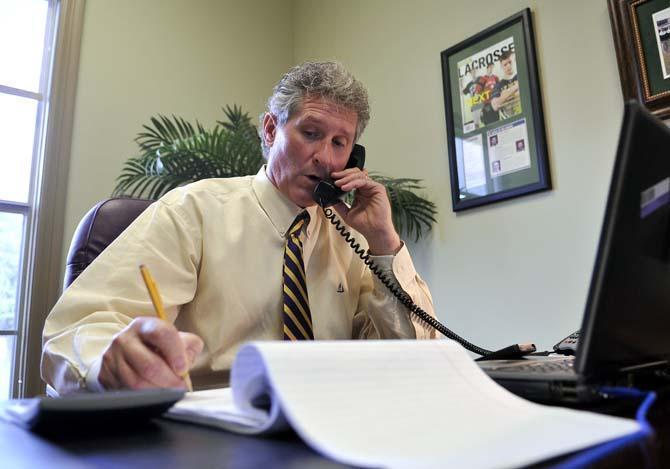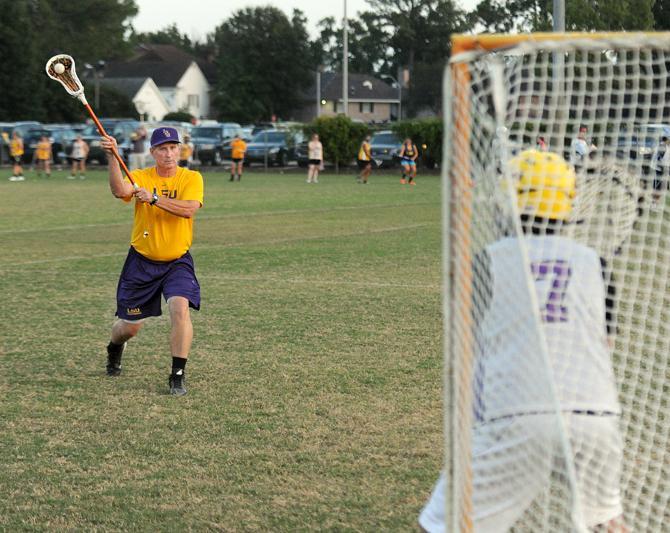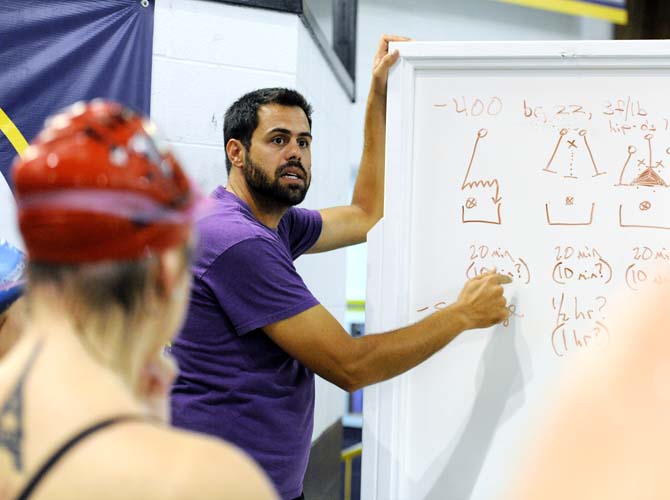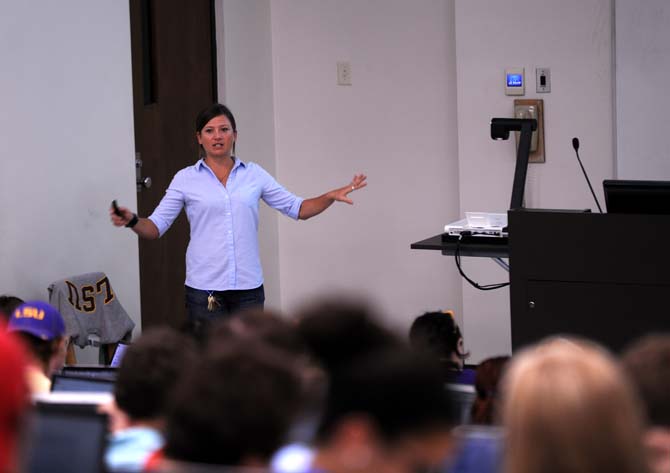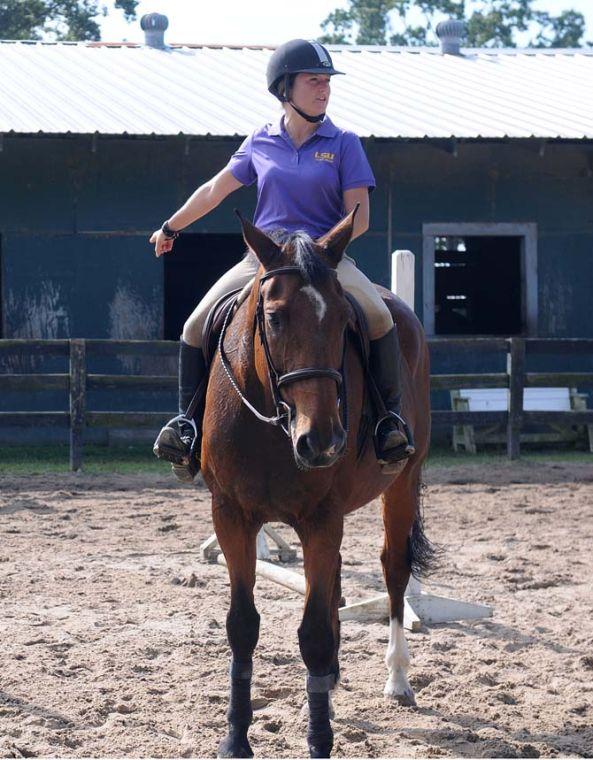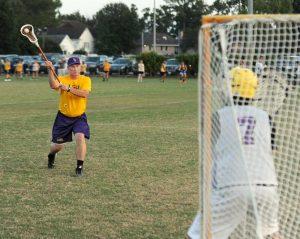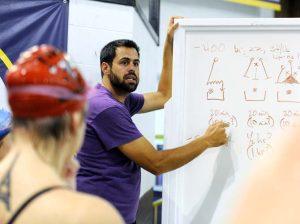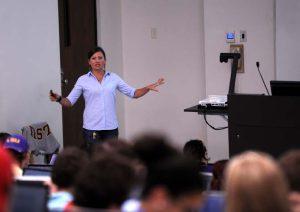At Premier Chemicals and Services off of Perkins Road, account manager Jeff Echols decorates his office with pictures of things most important to his life. Photos of Echols’s family line his desk, while one wall displays portraits of the Texas A&M — Echols’s alma mater — football team.
Most noticeable, though, are the pictures of the lacrosse teams Echols has coached over the last 13 years. This year he’ll add to that collection as he enters his first season as LSU’s lacrosse coach. These images depict not just the passion Echols feels for his teams, but the lengths he’s taken to coach them.
“I’ve been lucky to have lived in cities where I could pursue my passion [for lacrosse],” Echols said. “I don’t really know how to describe my passion except that God made me driven, and that spills into my professional work as well.”
Echols represents just one of the coaches of LSU’s 15 club sports. These coaches can be paid, but most must have another job to go along with coaching in order to maintain a decent living.
The jobs these coaches take can vary to wide degrees. For LSU Equestrian Club coach Leaf Boswell, teaching one group of LSU students wasn’t enough.
Although Boswell spent the past seven years coaching the Equestrian Club, this semester marks her first year as a biology professor at the University. Boswell has been a part of the team since coming to LSU as a freshman in 2000: first as a player, then as an assistant coach and head coach while attending graduate school.
“I have always said the last three or four years that, ideally, I’d like to continue coaching this team and get a position here,” Boswell said. “Then I have always said, ‘Too bad that’s probably never going to happen.’ Well, of course, then it happens.”
Since Boswell took over in the 2006-07 season, the Equestrian Club has made strides in overall development. The team saw its first member qualify for nationals in Boswell’s first season, while the team qualified for nationals for only the second time last year.
Last season’s performance becomes more remarkable considering Boswell coached while finishing graduate school and working as a teaching assistant. Being able to stay on track during busy times such as midterms week doesn’t faze her, she said.
“I always tell people, ‘You have time for what you have time for,’” Boswell said. “When people say they don’t have time for things, it is usually just a matter of how much you want it.”
In New Orleans, LSU water polo coach Russell Bernstein works as a pedicab driver for Bike Taxi Unlimited. Bernstein, a former professional water polo player, commutes to Baton Rouge two to three times a week to either coach practice or competitions for the team.
The constant rides to and from New Orleans make Bernstein think about his devotion to the team and the sport.
“I see similarities between myself and religious people,” Bernstein said. “Religious people have that thinking, ‘Why wouldn’t you want to go to church?’ My thinking is ‘Why wouldn’t I want to coach water polo?’”
Bernstein also works with two nonprofit organizations he created, serving as executive producer at Global Team Players Foundation, which empowers athletes to engage in the community and in philanthropy. He also handles duties as president of the Big Easy Pedicab Association, a group that unites pedicab drivers, owners and local stakeholders around New Orleans in an effort to improve the local economy and community.
Bernstein claims to be an entrepreneur by trade. He believes this quality translates to success in the pool for the team.
One of the best features of the water polo team is the multiple charities it contributes to, something Bernstein makes a great effort in working on. These charities include the Tennessee Association of Blind Athletes and SOS Rescue Baton Rouge, a local animal shelter.
“It is really helpful to have him around,” said Melanie Meisner, who is the team’s community service officer. “He shows a lot of interest in the charities, and it makes my job easier.”
Back at Premier Chemical, Echols works only one or two days a week in the office, a schedule which he claims benefits him “immensely.” If Echols ever doesn’t have enough time to finish something before a practice, other employees will help him finish his work so he can stay on schedule, he said.
When thinking of those lacrosse pictures along the walls, Echols remembers how useful things such as discipline and a well-made schedule can be. No matter the case, his love for this sport is unwavering.
“I look at those pictures of those teams I’ve coached and I see them as accomplishments,” Echols said. “I’m proud of those boys and their great memories. … You need a passion for a sport you don’t get paid for, and I truly believe I have it.”
Beyond the Clipboard: Club sports coaches maintain outside jobs while leading teams
October 15, 2013
Jeff Echols, head coach of the LSU lacrosse club, also has a job at Premier Chemicals and Services.



